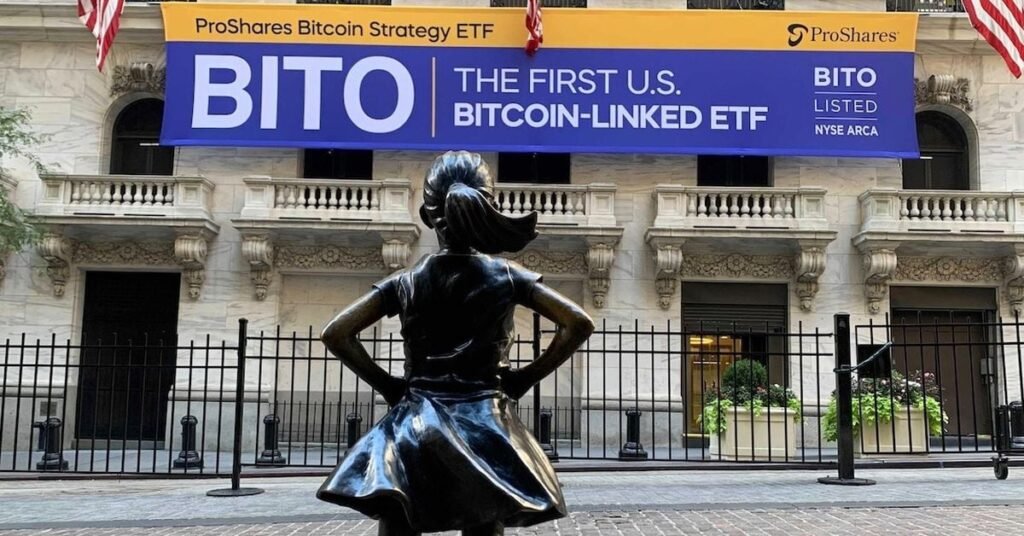
Jeff
Sommer,
a
weekly
finance
columnist
for
the
New
York
Times,
doesn’t
seem
to
like
bitcoin
ETFs.
Joke’s
on
him,
though,
because
everyone
else
seems
to.
Up-to-date
info
isn’t
available,
but
it’s
now
known
that
investors
have
poured
at
least
$1.9
billion
into
the
new
crypto-tracking
exchange-traded
funds
in
their
first
three
days
of
trading.
The
most
bullish
estimates
expect
up
to
$100
billion
flowing
into
bitcoin
funds
by
the
end
of
the
year.
This
is
an
excerpt
from
The
Node
newsletter,
a
daily
roundup
of
the
most
pivotal
crypto
news
on
CoinDesk
and
beyond.
You
can
subscribe
to
get
the
full
newsletter
here.
That’s
a
lot
of
pent-up
demand,
beating
the
last
record
inflows
of
$1.2
billion
within
three
days
in
2021
…
which
also
went
into
a
bitcoin-based
product,
ProShares
Bitcoin
Strategy
ETF
(which
tracked
bitcoin
futures
rather
than
its
spot
price),
Reuters
reported.
A
number
of
marquee
financial
firms
including
BlackRock,
Fidelity
and
Franklin
Templeton
lined
up
to
launch
bitcoin
ETFs,
and
are
now
also
considering
ether
(ETH)
funds.
And
yet,
Sommer
seems
ready
to
write
all
of
this
off.
“FOMO
is
the
main
reason
for
putting
money
into
Bitcoin,
which
remains
highly
speculative,
difficult
to
categorize
and
without
an
immediately
identifiable
economic
function,”
the
NYT
columnist
wrote
in
his
latest
edition
of
the
“Strategies”
newsletter,
referencing
the
U.S.
Securities
and
Exchange
Commission’s
(SEC)
anti-FOMO
bulletin.
FOMO,
aka
the
fear
of
missing
out,
is
certainly
a
part
of
crypto
investing.
For
instance,
it’s
the
main
driver
behind
degens
chasing
the
highs
of
meme
coins
like
BONK
or
dogwifhat,
which
truly
serve
little
economic
function
beyond
speculation.
But
to
write
off
bitcoin
simply
as
a
turn
of
the
roulette
wheel
with
$800
billion
on
the
table
is
to
willingly
mislead
oneself.
You
don’t
have
to
personally
believe
what
bitcoiners
believe
to
take
their
arguments
seriously,
for
fear
of
mockery
or
ostracization
(FOMOO)
by
your
crypto-skeptic
peers,
Jeff.
To
be
fair,
Sommer
did
tip
his
hat
to
the
technology
behind
Bitcoin,
i.e.
b
l
o
c
k
c
h
a
i
n,
to
hedge
his
own
argument.
To
wit:
“Bitcoin
is
a
serious
proposition,
in
terms
of
its
underlying
structure.
The
use
of
blockchain,
the
decentralized,
peer-to-peer
structure
and
the
complex
mathematical
code
demand
respect.
Concepts
embedded
in
Bitcoin
and
other
so-called
cryptocurrencies
could
have
real-world
importance
at
some
point…”
This
was
not
Sommer’s
only
completely
original
and
novel
thought,
he
also
steadfastly
argued
that
cryptocurrency
is
a
“misnomer”
because
cryptocurrencies,
despite
maybe
one
day
having
“real-world”
utility
somewhere,
are
not
really
“currencies.”
And,
he
said,
the
comparison
between
bitcoin
and
gold
is
off
because
gold
has
historical
“cache.”
As
the
great
and
powerful
Satoshi
Nakamoto
once
said,
“If
you
don’t
believe
me
or
don’t
get
it,
I
don’t
have
time
to
try
to
convince
you,
sorry.”
At
this
point
it’s
not
even
worth
addressing
these
extremely
tired
arguments,
which
seem
to
be
carried
out
by
seasoned
journalists
everytime
crypto
notches
some
victory.
But
considering
that
they’re
brand
new,
I’ll
try
to
do
Sommer
a
solid
and
get
him
up-to-date
on
why
interest
in
bitcoin
ETFs
is
more
than
FOMO.
Why
bitcoin
ETFs
First,
there
is
Bitcoin’s
philosophical
proposition
—
the
idea
that
there
ought
to
be
a
global,
stateless
monetary
network
available
to
all.
Often
called
a
libertarian
wet-dream,
the
Bitcoin
vision
is
so
simple
it
actually
slots
neatly
into
a
range
of
political
philosophies
—
from
globalizing
neoconservatism
to
historical
Marxism,
just
not
anything
truly
authoritarian.
Again,
you
don’t
have
to
buy
into
the
rising
trend
towards
populism
to
take
an
interest
in
it.
Many
people
are
feeling
with
the
spread
of
corporate
and
governmental
surveillance;
rising
economic
inequality;
and
other
geopolitical
issues
that
something
like
Bitcoin,
which
empowers
everyone
without
asking
for
anything
of
any
particular
user
in
return,
is
a
powerful
symbol
at
the
very
least.
Second,
there
is
the
fact
that
bitcoin
is
one
of
the
most
successful
economic
investments
on
record.
It
may
not
be
the
best
performing
asset
every
year,
and
certainly
many
people
have
lost
money
trading
it,
but
there
is
no
denying
bitcoin’s
meteoric
gains
over
the
past
decade
and
a
half.
This
is
where
the
idea
of
“hodling”
comes
in,
which
recommends
people
buy
and
hold
bitcoin
over
a
long
time
horizon,
because
even
if
the
always-volatile
bitcoin
dips,
those
are
only
paper-losses
until
you
sell.
Bitcoin
ETFs
help
a
larger
swath
of
retail
and
institutional
buyers
access
BTC,
typically
through
vehicles
like
retirement
accounts
or
corporate
treasuries
that
will
likely
hodl
for
years
if
not
decades.
True,
bitcoin
is
not
guaranteed
to
rise
in
price
and
could
even
drop
to
$0.
And
true,
as
Sommer
points
out,
there
are
other
ways
to
gain
exposure
to
crypto
via
traditional
routes,
like
buying
other
indexes
that
invest
in
crypto-related
stocks,
like
Coinbase,
MicroStrategy
or
the
many
publicly
listed
mining
companies.
Simply
put,
there
is
something
powerful
to
the
idea
of
actually
owning
an
asset
that
cannot
be
seized.
Spot
bitcoin
ETFs
are
a
poor
approximation
of
that
since
buyers
of
the
ETFs
never
actually
get
their
hands
on
bitcoin.
But
Sommer
is
shutting
himself
off
to
that
idea
early,
and
trying
to
convince
his
readers
that
the
massive
interest
in
bitcoin
that
was
just
demonstrably
proven
via
the
launch
of
11
bitcoin
ETFs
this
month
is
all
just
FOMO.
The
sad
thing
is,
the
argument
works
just
as
well
in
reverse:
Even
if
demand
for
bitcoin
is
just
a
matter
of
social
contagion,
then
so
is
skepticism,
because
you
need
to
hear
about
something
to
turn
away
from
it.
So,
check
your
sources.
CORRECTION
(JAN.
19,
2024):
Removes
reference
to
in-kind
redemptions,
which
were
not
part
of
the
SEC
process.